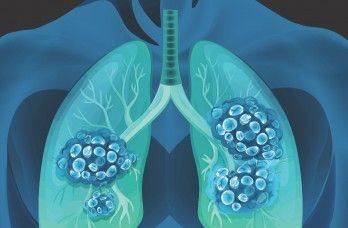Neoadjuvant Alectinib Effective, Tolerable in Late-Stage ALK-Positive NSCLC
Neoadjuvant alectinib met the primary end point with a major pathologic response rate of 42% in patients with potentially resectable stage III NSCLC.
In patients with stage III, ALK-positive NSCLC treated with neoadjuvant alectinib, at a median follow-up of 20.3 months, recurrence of disease was experienced by 18%, and 91% were alive.

Neoadjuvant alectinib (Alecensa) was effective and well-tolerated in resectable stage III ALK-positive non–small cell lung cancer (NSCLC), and may be an active and feasible perioperative option in the treatment of the disease, according to the final analysis of the phase 2 ALNEO trial (NCT05015010) shared at the 2025 American Society of Clinical Oncology (ASCO) Annual Meeting.
Major pathologic response (MPR) was achieved by 42% of patients (n = 14; 90% CI, 28%-58%), with pathologic complete responses (pCR) seen in 12% (n = 4; 95% CI, 3%-28%). Non-MPRs were seen in 40% (n = 13), and 18% of patients (n = 6) were not assessed; 5 patients did not undergo surgery, and 1 patient had an explorative thoracotomy.
The overall response rate (ORR) was 67% (n = 22); 0% experienced CRs, 67% (n = 22) experienced partial responses (PRs), 30% had stable disease, and 3% had progressive disease (n = 1).
At a median follow-up of 20.3 months (IQR, 12.3-34.1), recurrence of disease was experienced by 18% (n = 6), and 91% (n = 30) of patients were alive. The median event-free survival (EFS), disease-free survival (DFS), and overall survival (OS) were not reached.
“With the limitation of a small phase 2 nonrandomized trial, ALNEO study suggests alectinib as an active and feasible perioperative option in patients with resectable stage III ALK-positive NSCLC,” stated lead study author Marcello Tiseo, MD, PhD, of the Department of Medicine and Surgery at the University of Parma and the Medical Oncology Unit at the University Hospital of Parma in Italy, with coauthors in the presentation.
The trial enrolled 33 patients who completed neoadjuvant treatment consisting of 600 mg of alectinib twice a day for 2 cycles, 28 of whom advanced to surgery, and 26 of whom advanced to adjuvant treatment of 600 mg of alectinib twice a day for 24 cycles. Eligible patients had resectable locally advanced stage III NSCLC, were candidates for surgical resection after multidisciplinary discussion, had ALK-positive disease, received no prior treatment, and had an ECOG performance status of 0 or 1.
The median age of patients was 62 years (IQR, 49-74), 70% were women, 52% were nonsmokers, 76% had an ECOG performance status of 0, 97% had adenocarcinoma histology, 79% had a histological diagnosis, and 52% had an immunohistochemistry ALK evaluation. Additionally, stage IIA disease was present in 64% of patients, T3 stage in 31%, and N2 stage in 82%. It was noted that the most represented stages were T3N2 (24%), T2aN2 (15%), T4N0 (12%), and T4N2 (12%).
The trial’s primary end point was MPR, defined as 10% or less of the viable tumor, by blinded independent central review (BICR). The secondary end points were pCR by BICR, ORR, EFS, DFS, OS, and safety. There is also an ancillary biological study for the correlation of tissue and cell-free biomarkers with MPR and DFS. Tissue was collected at diagnosis and surgery; plasma was collected at baseline, after 4 and 8 weeks of neoadjuvant therapy, within 2 weeks of surgery, and at the time of recurrence.
Regarding surgery and downstaging, 85% of patients (n = 28) underwent surgery, and 86% (n = 24) were R0. The type of surgery included lobectomy in 64%, pneumonectomy in 9%, and other in 12%. Adjuvant alectinib was administered to 79% of patients, with a median of 5.1 weeks (IQR, 3.6-6.0) from surgery and a median of 14 cycles (range, 1-25). Also, 48% (n = 13/27) of patients had nodal downstaging.
In the neoadjuvant phase (n = 33), any treatment-related adverse events (TRAEs) were experienced by 100%, and grade 3 TRAEs by 9%; TRAEs led to dose reduction and treatment discontinuation in 6% and 0% of patients, respectively. Treatment-emergent AEs (TEAEs) included alanine aminotransferase increase (grade 1/2, 12%; grade 3, 3%), aspartate aminotransferase increase (15%; 0%), asthenia (15%; 0%), and diarrhea (3%; 3%).
In the adjuvant phase, any TRAE was experienced by 100% of patients, and grade 3 TRAEs by 12%; TRAEs led to dose reduction and treatment discontinuation in 27% and 4%. TEAEs included asthenia (grade 1/2, 23%; grade 3, 0%), increased bilirubin (23%; 0%), increased ALT (15%; 4%), and neutropenia (0%; 4%). No grade 4/5 or treatment-related serious AEs were observed in the neoadjuvant or adjuvant phases.
Reference
Leonetti A, Boni L, Gnetti L, et al. Alectinib as neoadjuvant treatment in potentially resectable stage III ALK-positive NSCLC: final analysis of ALNEO phase II trial (GOIRC-01-2020-ML42316). J Clin Oncol. 2025;43(suppl 16):8015. doi:10.1200/JCO.2025.43.16_suppl.8015